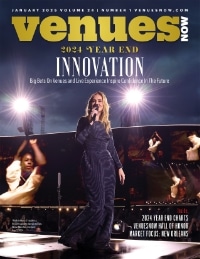LEGISLATURE TAKES AIM: Speculative tickets would be outlawed in Maryland under a bill that’s passed at the house and senate levels. (Credit)
Governor expected to sign bill
Merriweather Post Pavilion officials say they support the outlawing of scalping “speculative” tickets as Maryland overwhelmingly passed one of the country’s most comprehensive ticketing bills at the state level.
The state House and Senate agreed on SB 539, sponsored by Dawn Giles, an Anne Arundel County Democrat, and sent it to Governor Wes Moore for his signature. Most observers expect him to sign the bill, which passed the Senate unanimously and the House with a three-quarters majority on Monday. With Moore’s signature, the bill would become law on July 1.
As passed, the bill bans speculative ticketing and makes resale platforms accountable for any spec tickets listed and sold on their site, with a $10,000 fine for the first infraction and $25,000 on subsequent violations.
“People don’t know that the majority of tickets on these sites are by professional brokers who have no intention of seeing a show,” said Audrey Fix Schaefer, spokesperson for Merriweather Post Pavilion, an amphitheater in Columbia, Maryland, covering the Washington D.C. market. “They’re trying to scoop up the tickets either using bots to make sure that the consumer can only go if they pay through the nose.”
The bill requires all-in pricing throughout the purchasing process and codifies that a ticket is a license and not property. It directs the Consumer Protection Division of the Attorney General’s Office to conduct a review of the event ticket marketplace, which will assess reselling activity, ticket costs in the primary versus reseller markets and problems consumers encounter on the resale market, including the fraudulent sale of tickets, counterfeit tickets and the use of illegal bots to purchase tickets for resale.
Originally, the bill included a hard 10% cap on resale pricing, a provision that drew plenty of attention across the industry. That provision was removed during the legislative process, though the hopes are that the study will demonstrate to hesitant lawmakers that such a cap is needed.
“If the secondary scalpers continue to behave the way they have the past several years, it will show in this study and that will give us the pure data to go back to the State House and say, ‘OK, Maryland consumers are obviously getting gouged and deceived and now is the time to put in a cap where you can’t sell a ticket over face value,’” Schaefer said.
Merriweather Post Pavilion is poised to help the study by the Consumer Protection Division with data collection and enforcement. Early on the independently operated, 19,000-cap outdoor venue alerted customers about the affect of thelegislation. The result was 17,000 emails sent by Marylanders to their state legislators about protecting consumers from ticket fraud.
“It was eyepopping for me,” said Schaefer. “I got feedback from several legislators that they had never gotten that much communication from their constituents on any topic.”
Elkton Music Hall, All Good Presents supported the bill and the National Independent Venue Association and the Fix The Tix Coalition similarly praised the bill in statements provided to VenuesNow. They all said it marks a significant milestone in consumer protection for fans and artists from deceptive ticketing practices that have been taking place for too long in the industry, and they’re eager to use it as a model for ticketing reform nationally.
According to Schaefer, industry support for the bill is a sign that abusive behavior by brokers is no longer acceptable.
“People shouldn’t be gouged like they are,” Schaefer said. “It’s a business for some, but it’s detrimental for artists , consumers and venues. The fact that the behavior that goes on can turn people off of the whole concert going experience.”
Editor’s Note: Pollstar’s JR Lind contributed to this report.








